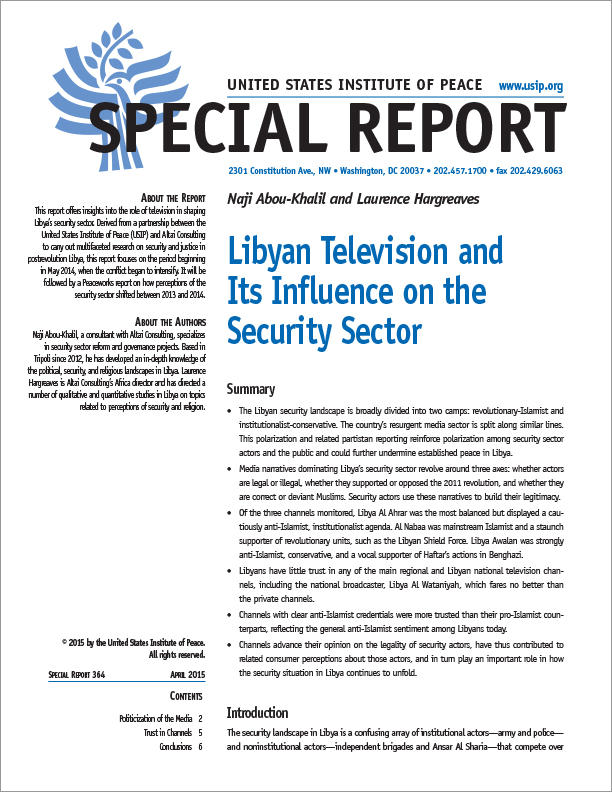During and after Libya’s revolution, national media outlets became known and popular for their balanced reporting. The situation in the few years since has changed, however. The security landscape in Libya today is a confusing array of institutional and non-institutional actors each asserting legitimacy. The country is on the brink of full-scale civil war. Its media has become both polarized and a key tool for many security actors. This report looks at three primary television channels to offer insights into the media’s role in shaping public perceptions and building political constituencies.
Summary
- The Libyan security landscape is broadly divided into two camps: revolutionary-Islamist and institutionalist-conservative. The country’s resurgent media sector is split along similar lines. This polarization and related partistan reporting reinforce polarization among security sector actors and the public and could further undermine established peace in Libya.
- Media narratives dominating Libya’s security sector revolve around three axes: whether actors are legal or illegal, whether they supported or opposed the 2011 revolution, and whether they are correct or deviant Muslims. Security actors use these narratives to build their legitimacy.
- Of the three channels monitored, Libya Al Ahrar was the most balanced but displayed a cautiously anti-Islamist, institutionalist agenda. Al Nabaa was mainstream Islamist and a staunch supporter of revolutionary units, such as the Libyan Shield Force. Libya Awalan was strongly anti-Islamist, conservative, and a vocal supporter of Haftar’s actions in Benghazi.
- Libyans have little trust in any of the main regional and Libyan national television channels, including the national broadcaster, Libya Al Wataniyah, which fares no better than the private channels.
- Channels with clear anti-Islamist credentials were more trusted than their pro-Islamist counterparts, reflecting the general anti-Islamist sentiment among Libyans today.
- Channels advance their opinion on the legality of security actors, have thus contributed to related consumer perceptions about those actors, and in turn play an important role in how the security situation in Libya continues to unfold.
About the Report
This report offers insights into the role of television in shaping Libya’s security sector. Derived from a partnership between the United States Institute of Peace (USIP) and Altai Consulting to carry out multifaceted research on security and justice in postrevolution Libya, this report focuses on the period beginning in May 2014, when the conflict began to intensify. It will be followed by a Peaceworks report on how perceptions of the security sector shifted between 2013 and 2014.
About the Authors
Naji Abou-Khalil, a consultant with Altai Consulting, specializes in security sector reform and governance projects. Based in Tripoli since 2012, he has developed an in-depth knowledge of the political, security, and religious landscapes in Libya. Laurence Hargreaves is Altai Consulting’s Africa director and has directed a number of qualitative and quantitative studies in Libya on topics related to perceptions of security and religion.
